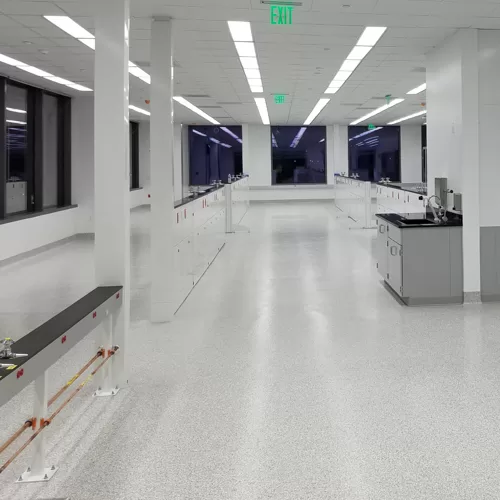Welcome to the Astra Polishing blog! Today, we’re diving into the world of industrial fluidapplied flooring—a highly versatile and durable flooring solution designed to meet the rigorous demands of industrial environments. Whether you’re managing a manufacturing plant, warehouse, or laboratory, industrial fluidapplied flooring offers exceptional performance and durability. Let’s explore how this flooring option can transform your facility.
What is Industrial FluidApplied Flooring?
Industrial fluidapplied flooring refers to a type of flooring system that is applied in a liquid form and then cures to form a seamless, durable surface. This flooring solution is typically made from resins such as epoxy, polyurethane, or polyaspartic, which are mixed with hardeners and applied to the substrate. The result is a tough, longlasting floor that can withstand heavy use and harsh conditions.
Key Features:
Seamless Application: Provides a continuous surface without joints or seams.
Customizable: Available in various formulations to meet specific performance and aesthetic requirements.
Durable: Designed to endure high traffic, impacts, and chemical exposure.
Benefits of Industrial Fluid-Applied Flooring
01
Durability and Longevity
Fluid-applied flooring systems are renowned for their durability. They can withstand heavy foot and vehicle traffic, impacts, abrasions, and chemical spills, making them ideal for demanding industrial environments.
Best For
Facilities with high traffic, heavy machinery, and exposure to chemicals.
02
Seamless and Hygienic Surface
The seamless nature of fluid-applied flooring eliminates joints and seams where dirt and bacteria can accumulate. This makes it easy to clean and maintain, promoting a more hygienic environment.
Best For
Clean rooms, food processing areas, and laboratories where hygiene is critical.
03
Chemical and Stain Resistance
Many fluid-applied flooring systems are resistant to chemicals, oils, and stains. This resistance ensures the flooring remains functional and attractive even in environments where spills and leaks are common.
Best For
Warehouses, automotive shops, and chemical processing facilities.
04
Customization and Aesthetics
Fluid-applied flooring can be customized with different colors, textures, and finishes to match your facility’s aesthetic and functional needs. It can also include nonslip additives for added safety.
Best For
Facilities looking to combine functionality with aesthetic appeal
05
Quick Installation and Minimal Downtime
The application process for fluid-applied flooring is relatively fast, and the flooring often cures quickly, minimizing downtime and disruptions to your operations.
Best For
Facilities needing a rapid turnaround with minimal impact on productivity.
Applications for Industrial FluidApplied Flooring
| Venue | Description | Example |
|---|---|---|
| Manufacturing Plants | In manufacturing settings, fluidapplied flooring can handle the demands of heavy machinery and high traffic. Its durability and ease of cleaning make it a practical choice for production areas. | Automotive assembly lines, machinery rooms. |
| Warehouses and Distribution Centers | The flooring’s resistance to impact and stains is ideal for warehouses where heavy loads and pallet trucks are common. A seamless surface also facilitates easy movement of goods. | Storage areas, loading docks. |
| Food and Beverage Processing Facilities | The seamless, hygienic surface is perfect for environments where cleanliness is paramount. It can handle spills and splashes while maintaining a sanitary environment. | Processing areas, bottling plants. |
| Laboratories and Clean Rooms | The nonporous, seamless nature of fluidapplied flooring meets the strict cleanliness standards required in laboratories and clean rooms. | Research laboratories, pharmaceutical manufacturing. |
| Commercial and Retail Spaces | In addition to industrial applications, fluidapplied flooring can be used in commercial spaces where durability and aesthetic appeal are important. Customizable options allow for creative design. | Showrooms, retail stores. |
Application Process
1. Surface Preparation: Clean and prepare the existing substrate to ensure proper adhesion. This may involve repairing any damage and ensuring the surface is free of contaminants.
2. Priming: Apply a primer to enhance the bond between the substrate and the fluidapplied flooring.
3. Application: Mix and apply the fluidapplied flooring material according to the manufacturer’s instructions. This may involve using rollers, squeegees, or other tools to spread the material evenly.
4. Curing: Allow the flooring to cure fully before subjecting it to traffic or heavy use. Curing times can vary depending on the product and environmental conditions.
5. Finishing: Apply any additional finishes, such as sealers or nonslip aggregates, if required.
Maintenance Tips
Regular Cleaning: Sweep or vacuum regularly to remove debris. Use a mild detergent and mop for deeper cleaning.
Prompt Spill Cleanup: Address spills promptly to prevent damage or staining.
Periodic Inspections: Check for any signs of wear or damage and address issues as needed to maintain the flooring’s performance and appearance.
Industrial fluid-applied flooring is a powerful solution for creating durable, seamless, and visually appealing surfaces in demanding environments. Its ability to withstand heavy use, resist chemicals, and facilitate easy cleaning makes it a top choice for various industrial and commercial applications.
If you’re interested in exploring industrial fluidapplied flooring for your facility or need assistance with installation, contact us at Astrapolishing. Our team of experts is here to help you find the perfect solution for your needs.

